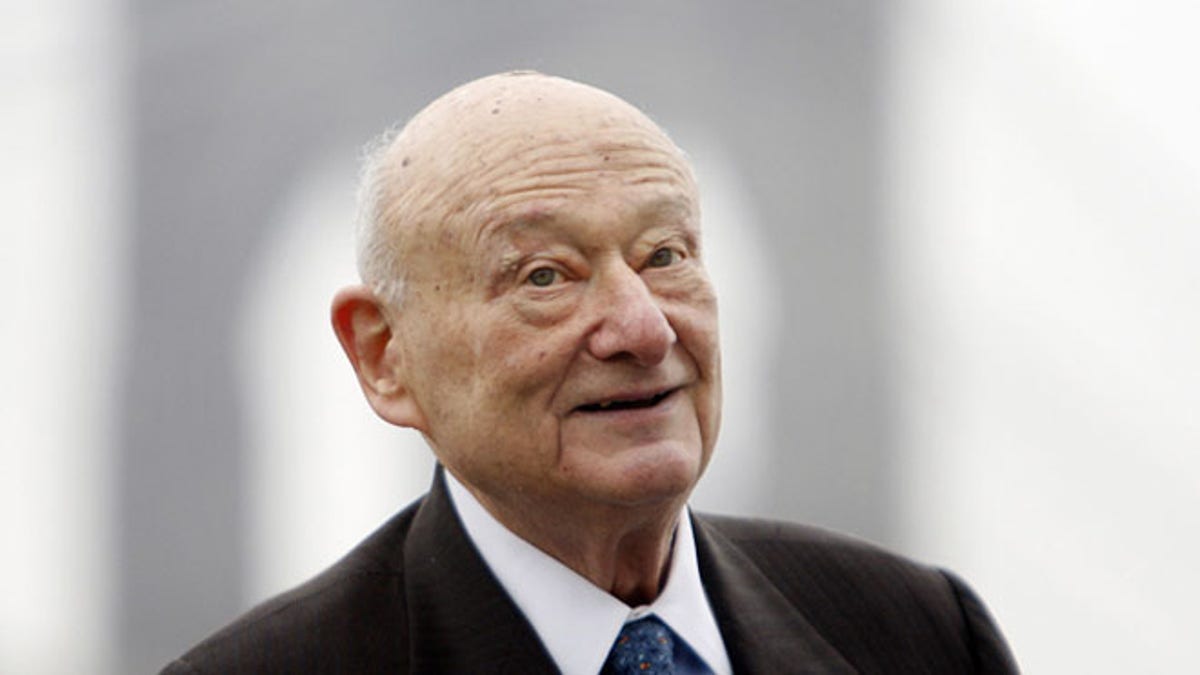
In this March 23, 2010 file photo, former New York Mayor Ed Koch speaks during a publicity event in New York. The FBI has for the first time released materials from its files on the former New York Mayor, who died earlier this year at age 88. (AP Photo/Seth Wenig, File)
NEW YORK – Documents released for the first time Tuesday from the FBI file on former New York City Mayor Edward Koch detail one of the more obscure chapters of his storied political career: an unsolved plot to paint the then-congressman as a racist by circulating a forged letter, warning the city would become a "ghost town" if voters elected a black mayor.
The documents were posted on an FBI website in response to multiple Freedom of Information Act requests made since Koch died earlier this year at 88.
While the letter episode may not be embedded in public memory, "it's a window onto the period," Koch's longtime spokesman, George Arzt, said Tuesday.
According to the FBI documents, the scheme unfolded in January 1977 in the lead up to a fiercely contested mayor's race that ultimately unseated Mayor Abe Beame. Besides Koch, Democratic candidates also included future Gov. Mario Cuomo, Rep. Bella Abzug, Rep. Herman Badillo and Manhattan Borough President Percy Sutton, who was black.
Numerous local politicians got copies of what looked to be a racially inflammatory letter from Koch to Badillo. The letter claimed Beame's administration had discriminated against Hispanics while allowing "Black Power groups in the city to run part of his administration."
"We are now faced with a crisis should the City Administration suddenly, fall in the hands of a Black Mayor," it said, adding that "all of my white constituents" would leave the city, "taking the money with them and New York City will become a ghost city."
Koch and Badillo held a press conference to disavow any connection to the letters -- and Koch contacted the FBI, suggesting the missives were retaliation for his efforts to increase scrutiny of drug rehabilitation clinics, particularly a Bronx group called the Hispanic Association for a Drug Free Society, or SERA. Koch had written letters urging city agencies to stop subsidizing the group after its director was convicted of conspiring to extort money from building contractors by putting pipe bombs at construction sites, and the city and state cut off their payments to the clinic in spring 1977, according to news reports at the time.
Koch told the FBI he'd heard indirectly about death threats directed against him because of his probe of the drug clinics and had previously contacted police and then-U.S. Attorney General Edward Levi about his safety. Koch told FBI agents in late January 1977 that "he does not have serious reservations as per his personal safety, but he is concerned," they wrote.
FBI agents interviewed a man at the Bronx drug clinic -- his name is redacted -- who said he didn't know who sent the letters. But he made it colorfully clear that he hated Koch, vowing that, as soon as he was off federal parole, he'd beat the congressman up in public in Washington.
"I hate him. Any enemy of Koch is a friend of mine, no matter what he does. I'm going to beat (him), and I don't care if I go to jail," the interviewee said, according to FBI notes of the March 1977 interview.
Meanwhile, other strange episodes ensued. Two people turned up at Koch's Manhattan congressional office in February 1977, circulating pamphlets calling for his impeachment and accusing him of bigotry and various misdeeds; the FBI approached two men leaving the building with a stack of the fliers, but they wouldn't say who provided them, the files show.
The next month, a Koch aide told FBI agents he'd been followed home from Koch's office, recounting a scene that could have been in a spy movie as he sped up the FDR Drive to shake the apparent pursuer. The next day, the aide found bullets near his car, and someone had apparently tried to open its hood during the night, he told authorities.

